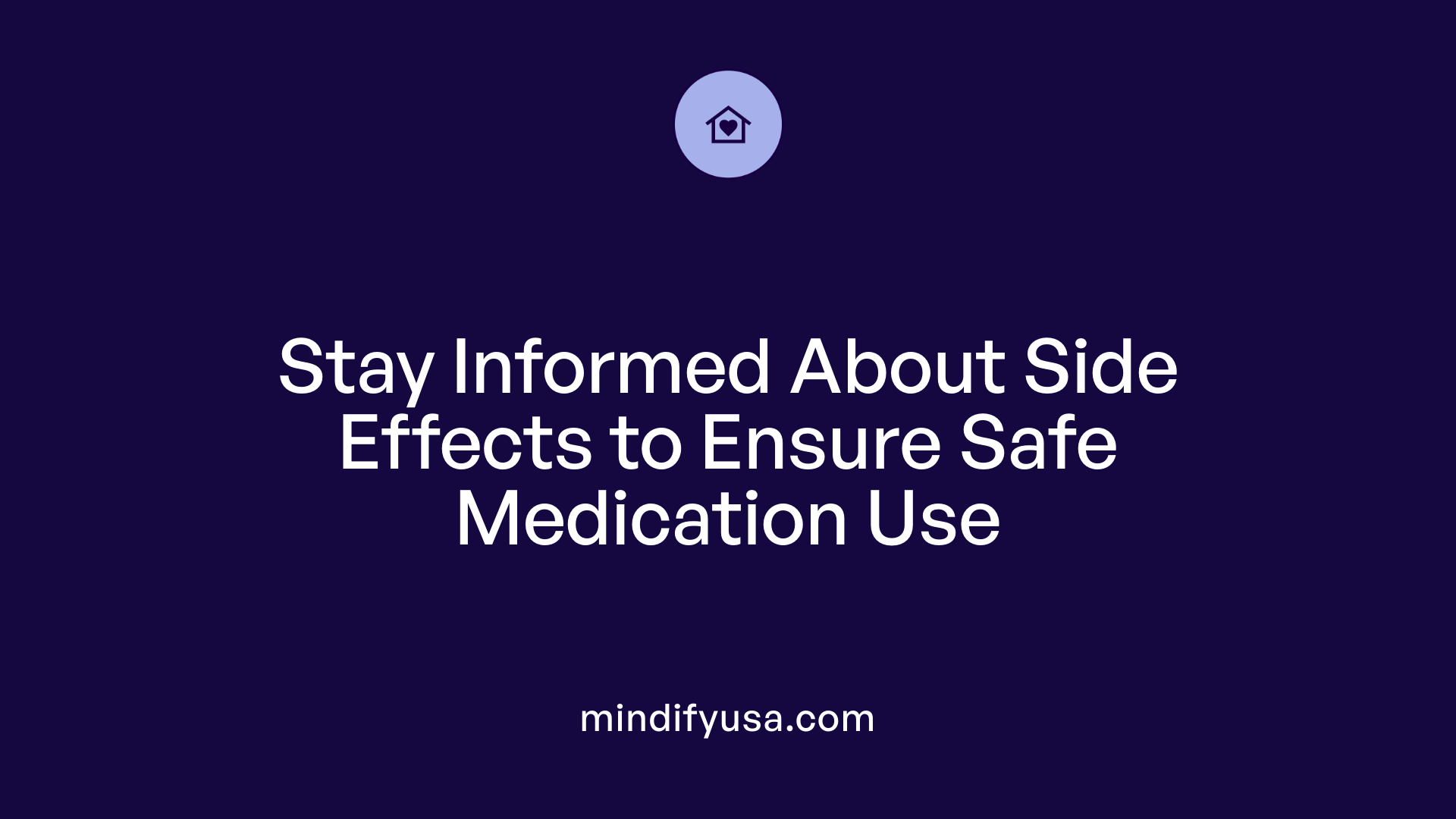Understanding and Minimizing Medication Side Effects
Navigating medication adjustments can be challenging, especially when trying to minimize side effects. This comprehensive guide offers practical strategies for managing medications effectively, reducing adverse reactions, and ensuring safety. From understanding common side effects to personalized dosing adjustments, readers will learn how to optimize their medication routine with confidence and care.
Recognizing Common Medication Side Effects and Their Causes

What are common side effects of medication?
Medications can cause a range of side effects, which can vary from mild to severe. Common issues include nausea, dizziness, fatigue, dry mouth, headache, and gastrointestinal problems such as diarrhea or upset stomach. Some individuals may also experience skin reactions or allergic responses, like rash or swelling. The type and likelihood of these side effects depend on the specific medication, its dosage, and individual factors.
Side effects can appear at different times, such as when starting a medication, during dose adjustments, or after stopping treatment. While many are temporary and may resolve as the body adjusts, some can persist and require medical intervention. Serious reactions—like heart issues, internal bleeding, or allergic emergencies—warrant immediate medical attention. Healthcare providers can offer detailed information on potential side effects for each medication, helping patients recognize and promptly report any unusual or severe symptoms.
Identifying Medications That Pose Higher Risks of Dangerous Side Effects
Which medications are known to cause dangerous side effects?
Many medications, including prescription drugs, over-the-counter remedies, and herbal supplements, can potentially lead to severe adverse effects, though such reactions are generally uncommon. Certain high-risk medications require close supervision due to their potential to cause serious health problems.
Blood thinners like warfarin increase the risk of dangerous bleeding, requiring regular monitoring of blood clotting. Opioids such as morphine and oxycodone can cause respiratory depression, which may be life-threatening if not carefully managed.
Certain antibiotics, including fluoroquinolones, have been associated with allergic reactions, tendon injuries, or severe infections such as Clostridioides difficile. ACE inhibitors, like lisinopril, pose risks of angioedema, a potentially life-threatening swelling, especially in allergic individuals. Statins, used for lowering cholesterol, have rare side effects such as muscle breakdown (rhabdomyolysis).
Diabetes medications, including insulin and sulfonylureas, can cause dangerously low blood sugar if doses are not properly adjusted.
Other drugs, like sedatives, anticholinergic medications, and antipsychotics, may increase fall risk, cause confusion, or raise the likelihood of stroke, particularly in older adults.
Because of these risks, deep understanding and ongoing monitoring are crucial. Patients should regularly consult healthcare providers to assess their risk factors and ensure safe medication use.
What precautions can be taken when using high-risk drugs?
Patients on high-risk medications should be aware of potential side effects and attend regular medical checkups. Sharing a comprehensive list of all medications and supplements with healthcare providers helps prevent dangerous interactions.
Monitoring often involves blood tests, blood pressure checks, or other assessments to catch side effects early. Adjustments in dosage, timing, or switching medications might be necessary to minimize risks.
It is essential to report any unusual symptoms or side effects immediately. In some cases, reducing dosage or discontinuing medication under medical supervision can prevent severe adverse reactions.
Why is ongoing consultation with healthcare professionals important?
Ongoing supervision from healthcare providers helps to tailor medication plans suited to individual health profiles. Doctors and pharmacists can provide detailed safety information, warn about specific risks, and suggest alternative therapies if necessary.
If you are prescribed high-risk drugs, inquire about the specific dangers and signs of adverse effects. Regular follow-ups ensure your medication regimen remains safe and effective, reducing the chances of serious complications.
By understanding the medications with higher risks and adhering to medical advice, patients can protect themselves from dangerous side effects and maintain better overall health.
| Medication Type | Potential Serious Side Effects | Precaution Notes |
|---|---|---|
| Blood thinners | Bleeding, hemorrhage | Regular blood tests needed |
| Opioids | Respiratory depression, addiction | Use only as prescribed |
| Antibiotics | Allergic reactions, tendon issues | Monitor for allergic symptoms |
| ACE inhibitors | Angioedema, kidney effects | Monitor swelling and kidney function |
| Statins | Rhabdomyolysis, muscle pain | Report muscle pain to doctor |
| Diabetes meds | Severe hypoglycemia | Frequent blood sugar monitoring |
| Sedatives/Antipsychotics | Falls, confusion, stroke | Use lowest effective dose |
Remaining vigilant and maintaining open communication with your healthcare team can significantly reduce risks associated with these medications.
The Role of Adequate Hydration in Medication Effectiveness
Does drinking water reduce the effects of medication?
Proper hydration plays a crucial role in the effectiveness and safety of many medications. Drinking enough water generally does not diminish how medications work; instead, it supports their proper absorption and processing within the body. Water helps medications move smoothly from the mouth into the stomach and intestines, where they are absorbed into the bloodstream.
It also aids the kidneys in filtering waste and medication residues, reducing the risk of side effects caused by accumulation. For those taking drugs that can upset the stomach or cause dry mouth—such as blood pressure medications or antidepressants—hydration can help mitigate these issues.
Most healthcare professionals advise drinking an adequate amount of water with medication, but the exact amount can depend on individual health, the specific drug, and other factors. A good rule is to follow the instructions on the medication label or those given by your healthcare provider.
While hydration is beneficial, it’s advisable to avoid excessive caffeine or alcohol. Both can lead to dehydration, counteracting the benefits of drinking water. Instead, focus on plain water and other non-sugary, non-caffeinated fluids to maintain optimal hydration.
Maintaining good hydration not only supports medication effectiveness but also contributes to overall health, helping prevent side effects like constipation and dry mouth. Always consult your healthcare provider if you have questions about hydration and medication or if you experience side effects that might be related to your fluid intake.
Practical Strategies for Reducing and Managing Side Effects
How can I reduce the side effects of my medication?
Managing medication side effects involves a combination of medical guidance and lifestyle adjustments. It is crucial to first speak with your healthcare provider about any persistent or severe symptoms. They might suggest adjusting the dose, changing the timing of medication intake, or switching to an alternative drug.
Adjusting when you take your medication can make a difference. For example, taking certain drugs with food can ease stomach upset, while taking others at bedtime may reduce drowsiness during the day. Always follow your doctor's instructions regarding timing and dosing.
In addition to medication adjustments, lifestyle changes can help. Staying well-hydrated, avoiding alcohol, and maintaining a balanced diet are beneficial. Regular physical activity and adequate sleep support overall health and can minimize side effects like fatigue or mood changes.
Keeping a detailed journal of your symptoms is also valuable. Record when side effects occur, their severity, and any other relevant factors like food intake or activity levels. This information can help your healthcare provider tailor your treatment plan and explore options like dose reduction or additional supportive medications.
Never modify your medication regimen without consulting your healthcare professional. If you experience serious or dangerous reactions, seek immediate medical care to ensure safety and appropriate treatment.
Diet and Food Interactions to Minimize Side Effects
What foods should I avoid to minimize medication side effects?
Managing medication side effects can often involve paying attention to your diet. Since certain foods can interfere with how medications are absorbed or metabolized, it is vital to follow your healthcare provider's specific advice.
Generally, steer clear of highly acidic, fatty, sugary, or spicy foods if they tend to worsen your side effects. For example, fatty meals can increase the absorption of some drugs, leading to heightened side effects, while spicy foods may irritate the stomach when taking medications like NSAIDs or antibiotics.
Alcohol and caffeine are also important to watch. Alcohol can enhance drowsiness, dizziness, or liver strain, and may cause dangerous interactions with certain drugs.
Some medications, such as corticosteroids, NSAIDs, and certain antibiotics, are best taken with food to protect your stomach. However, for others, specific foods should be avoided.
Particularly noteworthy is the interaction between grapefruit juice and many medications. Grapefruit contains compounds that can inhibit enzymes involved in drug breakdown, leading to increased medication levels and potential toxicity. Always check whether your medication has known interactions with grapefruit or other citrus fruits.
Reading labels carefully and consulting your healthcare provider can help tailor dietary choices to your medication regimen. When in doubt, seek personalized advice to ensure safe and effective use of your medications with your diet.
Emergency and Persistent Side Effects: When to Seek Medical Help
What should I do if I experience severe side effects from medication?
Severe side effects from medication can be life-threatening or cause significant health concerns. If you notice symptoms such as heavy bleeding, signs of organ damage, or severe allergic reactions—like difficulty breathing, swelling of the face or throat, or a widespread rash—you must seek emergency medical care immediately.
It’s crucial to contact your healthcare provider as soon as possible for any persistent or severe side effects. Keep a detailed symptom diary, noting the nature, severity, and timing of these effects, which can help your doctor determine the best course of action.
In critical situations, do not wait. Go to the nearest emergency room or call emergency services. Prompt medical attention can prevent serious complications and guide you on whether to continue, adjust, or stop your medication safely.
Knowing when to seek urgent help can make all the difference. Always prioritize emergency care when experiencing symptoms that threaten your health or safety.
For more detailed guidance, consult your healthcare provider or search
Ensuring Safe and Effective Medication Use
Adjusting medications with fewer side effects involves a combination of awareness, communication, and lifestyle management. Regular consultations with healthcare providers, detailed record-keeping, and understanding individual factors such as age, weight, and genetics are vital. Implementing proper routines, adhering to prescribed instructions, and being vigilant about potential interactions can significantly enhance medication safety. Remember, never alter your medication regimen without professional approval, and seek medical attention promptly for severe or persistent side effects. With informed strategies and ongoing support, you can optimize your treatment outcomes while minimizing risks.
References
- How to Deal With Side Effects of Medicine - WebMD
- 6 top tips for adjusting to new medication - British Heart Foundation
- Medication side effects: What are your options? - Harvard Health
- How to Manage Medication Side Effects | Banner Health
- Medication Management and Safety Tips | Johns Hopkins Medicine
- How To Manage Side Effects During Medication Management
- Taking Medicines Safely as You Age | National Institute on Aging
- How to Manage Common Drug Side Effects - Drugs.com






































































































